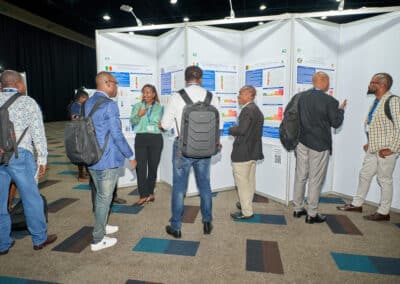As part of its mission to support the scale up of differentiated service delivery (DSD) for HIV, the Coverage, Quality, and Impact Network (CQUIN), led by ICAP at Columbia University, is seconding staff to ministries of health to spearhead the expansion of DSD at national scale. This is one of many efforts by the learning network to help partner countries in sub-Saharan Africa reach the UNAIDS 90-90-90 targets and achieve epidemic control.
Clorata Gwanzura, MBChB, MPH, is the differentiated care medical officer at the Zimbabwe Ministry of Health and Child Care (MoHCC) AIDS and TB Program. Dr. Gwanzura is seconded by ICAP to the MoHCC, and is responsible for establishing a national DSD steering committee; engaging and orienting provinces and stakeholders; and spearheading knowledge management.
“In Zimbabwe, the myriad of partners working in the health sector makes it difficult to know and consolidate who is working on what and where,” said Dr. Gwanzura. “My job is to ensure that individuals and organisations implementing DSD are identified, and that we work together to implement services in line with national guidance.”
Dr. Gwanzura explained that standardization of DSD is enshrined in the country’s Operational and Service Delivery Manual for HIV programs (OSDM), which drives the five DSD models her country has adopted: fast track refills; family refills; facility club refills; community antiretroviral refill groups (CARGs); and outreach services.
One of her first major assignments was to begin the rollout of the DSD models and to establish a steering committee, which meets quarterly to plan for and review progress of implementation. The national rollout, she explained, started with sensitization and training for Ministry of Health stakeholders and partners. “All 10 provinces in Zimbabwe had trained cadres from 10 high-volume facilities,” she said. “The remaining facilities are in various stages of implementation though the mentorship platform.”
Two districts were set up as learning districts for the implementation of the various models, and review for these processes will be completed early in 2018. The results will further strengthen DSD implementation in Zimbabwe. Dr. Gwanzura is also a co-investigator in the CQUIN-supported study of male involvement in CARGs, now in its final stages.
In Zimbabwe, prevention programs aimed at behavior change, elimination of mother-to-child transmission services, and successful treatment care and support services have cut the prevalence of HIV in half, from a peak of 30 percent in 1997, to 15 percent in 2015. The southern African nation was also an early adopter of decentralization of care and task shifting, and has seen successes in retention in implementing DSD with adolescent- and peer-led approaches.
“What we are hoping to see is an uptake of DSD across Zimbabwe,” said Dr. Gwanzura. “We want health care workers to be able to address the challenges they are facing at their facilities.”
A second medical officer will take on a similar role in Swaziland in early 2018. The officer will be seconded to the National AIDS Programme (SNAP) at the Swaziland Ministry of Health.
This story is part of a series focused on the evolution of the CQUIN network, and countries’ progress in improving differentiated service delivery. To follow this story and others, sign up for the network’s monthly newsletter.






